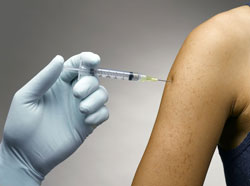As the nascent field of genetics looms large across the frontlines of tomorrow’s medicine, the impact of the legality of gene patents today will have far-reaching consequences on how we may conduct genetic testing to assess the prognosis of various diseases.
Genes are the hereditary units of living organisms. They are composed of stretches of DNA and RNA that code for other RNA chains and proteins, one of the chief building blocks of life.
On May 12, 2009, the American Civil Liberties Union (ACLU) and the Public Patent Foundation filed a lawsuit charging the patents of Myriad Genetics, a Utah based molecular diagnostics company, on two genes associated with the risk of developing breast and ovarian cancer to be unconstitutional and invalid.
The plaintiff in the lawsuit filed, Association of Molecular Pathology, et. al. vs. U.S. Patent and Trademark Office and Myriad Genetics, et al., represented women patients, breast cancer survivors, cancer research and health advocates, researchers, genetic counselors, and various scientific associations consisting of “150,000 geneticists, pathologists, and laboratory professionals,” according to the ACLU.
This lawsuit was filed against Myriad Genetics and the University of Utah Research Foundation because they have patented the genes BRCA1 and BRCA2 on the human genome.
Under the First Amendment, the plaintiff charged the gene patents of Myriad Genetics to be unconstitutional because genes are the products of nature and therefore, cannot be patented.
The patents, which were originally granted in 1994 and 1995 for BRCA1 and BRCA2 respectively, allow Myriad Genetics to set its own terms and costs for genetic testing of these genes. Because all genetic testing must go through Myriad Genetics, this consequently makes it nearly impossible for at-risk women to access alternate genetic tests or get second opinions about their results.
The lack of alternate modes of genetic testing as a result of the gene patents has already yielded serious consequences. Kathleen Maxian from Buffalo, New York, is presently suffering from a late-stage ovarian cancer that she believes could have been prevented.
Maxian’s sister, a breast cancer survivor, attained a genetic test from Myriad Genetics that showed that she was negative for genetic mutations.
It would be years later however when her sister found out that she did have a BRCA genetic mutation when Maxian realized she could have sought preventative surgery to counter the ovarian cancer before its exacerbation. The ACLU attests that numerous labs across the U.S. could have stated that they are capable of providing a form of comprehensive genetic screening that would have helped people like Maxian, and would do so were it not for the patents.
As 20 percent of our genes are already patented, Dr. Greg Moehring, Associate Professor and Chair of chemistry, medical technology and physics, said, “Companies will patent as many genes that are commercially useful, if things continue as is.”
It is important to note that although Myriad Genetics’ gene patents may trim the milieu of BRCA testing to one company, the patents do not hinder scientific research itself. According to Myriad Genetics, their patents do just the opposite by facilitating research and ensuring a full disclosure of their discoveries.
Since the discovery of the BRCA genes about 20 years ago, almost 10,000 research papers regarding such genes have been published. Furthermore, Myriad Genetics provides testing, at cost, to any researcher funded by the National Cancer Institute.
In March, 2010, a New York federal district court ruled that the patents on BRCA1 and BRCA2 by Myriad Genetics were invalid. Sixteen months later, in July 2011, a federal appeals court ruled that gene patents can be obtained by companies but companies cannot patent methods to compare those gene sequences.
In response to its unanimous ruling in another decision, the Supreme Court directed the appeals court in March 2012 to reconsider its initial ruling regarding validity of gene patents, according to the Genomics Law Report.
In August 2012, the federal appeals court however, ruled once again that companies can obtain gene patents. The Supreme Court agreed in November 2012 to hear the plaintiff’s arguments on gene patenting in its current session.
Sam Broadbent, third-year chemistry major, said “It is frightening to believe that human genes can be patented and a select few individuals can have the right over the specific gene.”
He added, “With the current rate at which genes are being patented, it gives foresight into a future in which human genes are more aggressively controlled due to patents. This case serves as an important milestone in how far human genes can be patented and controlled by individuals.”



